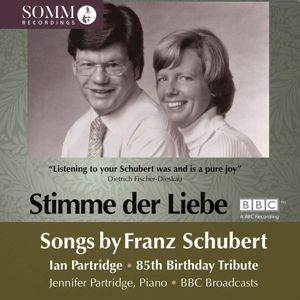
Franz Schubert (1797-1828)
Stimme der Liebe
Ian Partridge(tenor/piano)
Jennifer Partridge (piano); Ernest Lush (piano)
rec. live 1968-1972, BBC broadcasts. AAD
First releases on disc
German texts and English translations
Somm Recordings SOMMCD0670 [68]
Alongside my favourite recordings of Schubert’s Die schöne Müllerin from Aksel Schiøtz and Fritz Wunderlich, is Ian Partridge’s 1973 account with his sister Jennifer as his accompanist; it is extraordinary to think that this recording is now fifty years old and that the singer has turned 85 years old. This compilation of live BBC recordings of him singing twenty Schubert songs never previously released is a birthday tribute to a singer who, despite having sung in only one opera throughout his career – Iopas in Berlioz’ Les Troyens, at Covent Garden – beautifully sung and of course later recorded in the classic set – has been a major fixture in British music for over sixty years. His tenor is light and somewhat reedy, with a slightly plaintive timbre and perhaps objectively of no special quality or resonance, yet his sensitivity to word painting, the evenness of his tone throughout the compass of his voice and his sheer musicality all combine to create a sum of parts considerably more engaging than might be expected – furthermore, unlike too many singers, he maintained its quality over many years, ensuring a career of remarkable longevity; he gave his last recital in 2008, aged seventy.
Astonishingly, he claims never to have learned to speak German yet his enunciation in that language was praised by no less a Lieder singer than Fischer-Dieskau, who wrote to him in 2009 in reply to receiving a disc and a letter, praising his evident “respect and love for the music”. That letter is reproduced in the substantial booklet which gratefully contains texts and translations and commentaries on each of the twenty songs by Richard Stokes, Professor of Lieder at the Royal Academy of Music, London. Most of the songs here bear witness to the symbiosis between Ian Partridge and his sister Jennifer, but in the penultimate group of three songs he accompanies himself, and in the last two songs the pianist is Ernest Lush, who accompanied so many famous singers and instrumentalists in BBC concerts.
I am immediately captivated by the lilt of the opening song, even though the recording balance and quality is not ideal – the piano is somewhat clangourous and over-reverberant and there is an element of distortion – but the ease of Partridge’s tenor in the higher-flying passages, the seamless line and merest hint of flickering vibrato are all subtle but telling assets in these songs, which have mostly been selected to cohere as a collective witness to “the pangs of despised love” (or is it “disprized”? No matter – both fit). The cheerful, perky chirruping of “Der Einsame” lifts the mood but still bespeaks solitude. Partridge is able to fine away his tone to a thread as in the close to “Nachtviolen”, then in the much more forceful “An mein Herz” which ensues, he summons up considerable heft not only in the top notes but also in the lower reaches of his tenor, as in the line “Doch klagen sollst du nicht mehr”.
As much as I love Schubert’s Lieder, nobody can expect to be familiar with all six hundred of them, so I enjoyed the element of surprise involved in encountering a few here that I did not know. One such is “Der blinde Knabe” (The Blind Boy) translated from a Colley Cibber poem, sung and played by the sibling partnership here with an admirable directness that eschews sentimentality. Another is Partridge’s own favourite “Vor meiner Wiege” (Before my cradle); its central stanza expands so touchingly and lyrically in the major key, then defaults into a typically Schubertian minor-key melancholy which prefigures death yet is nonetheless somehow consolatory. Ian Partridge is right in his assertion that it should be more popular. He makes a lovely job of the famous, minimalist “Ihr Bild” (Her Likeness), and the rationale for his interpretative approach is explained in the notes. Its grim despair contrasts neatly with the rocking metre and blithe insouciance of the next song “Das Fischermädchen” (The Fisher Maiden) and long lines and the swelling passion of “Nacht und Träume (Night and Dreams); the programme here is cunningly devised, ensuring constant variety. – indeed, this is a charming anthology collected in tribute to a master interpreter of Schubert Lieder. It might be in only adequate sound but it remains highly engaging.
(Note: In “Die Liebe hat gelogen” (Love has lied), Partridge sings “Es fließen heißen Tropfen” – Hot tears flow – whereas the text has the verb “rinnen” – “drop”, “leak” or “run” – perhaps not as “poetic”, hence the change…)
Ralph Moore
Previous review: John Quinn (July 2023)
Help us financially by purchasing from


Contents
Im Frühling
Erster Verlust
Dass sie hier gewesen
Der Einsame
Nachtviolen
An mein Herz
Die gefangenen Sänger
An den Mond, D.193
Der blinde Knabe
Über Wildemann
Vor meiner Wiege
Bei dir allein!
Die Liebe hat gelogen
Nähe des Geliebten
Alinde
Ihr Bild*
Das Fischermädchen*
Nacht und Träume*
Stimme der Liebe**
Sei mir gegrüsst**
All songs accompanied by Jennifer Partridge except *, in which Ian Partridge accompanies himself, and **, where the pianist is Ernest Lush.


















